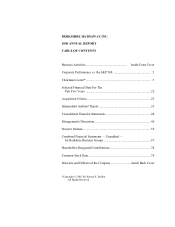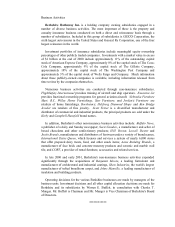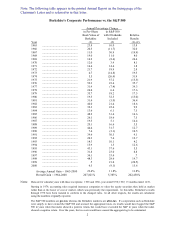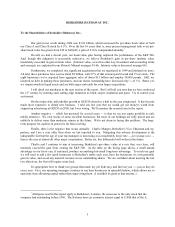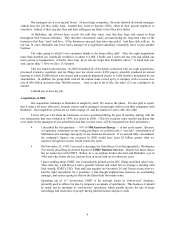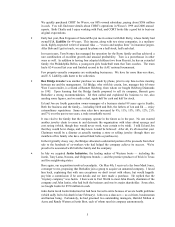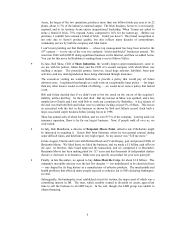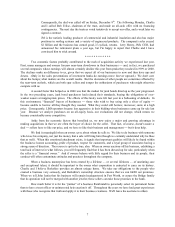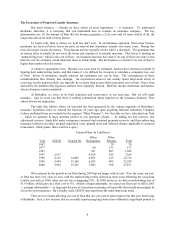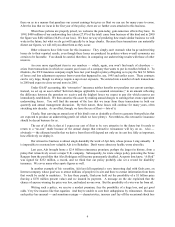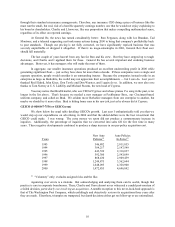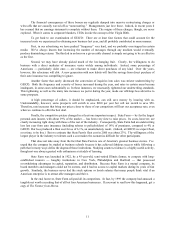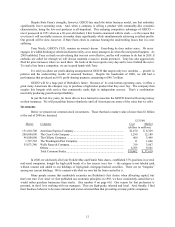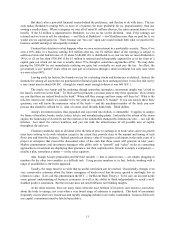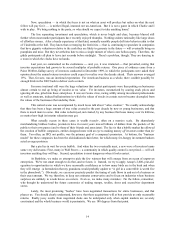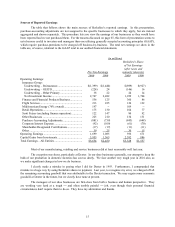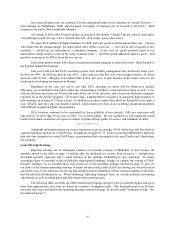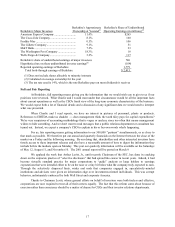Berkshire Hathaway 2000 Annual Report Download - page 8
Download and view the complete annual report
Please find page 8 of the 2000 Berkshire Hathaway annual report below. You can navigate through the pages in the report by either clicking on the pages listed below, or by using the keyword search tool below to find specific information within the annual report.7
Consequently, the deal was called off on Friday, December 8th. The following Monday, Charlie
and I called Bob Felise, chairman of the trust, and made an all-cash offer with no financing
contingencies. The next day the trustees voted tentatively to accept our offer, and a week later we
signed a contract.
JM is the nation’s leading producer of commercial and industrial insulation and also has major
positions in roofing systems and a variety of engineered products. The company’s sales exceed
$2 billion and the business has earned good, if cyclical, returns. Jerry Henry, JM’s CEO, had
announced his retirement plans a year ago, but I’m happy to report that Charlie and I have
convinced him to stick around.
* * * * * * * * * * * *
Two economic factors probably contributed to the rush of acquisition activity we experienced last year.
First, many managers and owners foresaw near-term slowdowns in their businesses and, in fact, we purchased
several companies whose earnings will almost certainly decline this year from peaks they reached in 1999 or 2000.
The declines make no difference to us, given that we expect all of our businesses to now and then have ups and
downs. (Only in the sales presentations of investment banks do earnings move forever upward.) We don’t care
about the bumps; what matters are the overall results. But the decisions of other people are sometimes affected by
the near-term outlook, which can both spur sellers and temper the enthusiasm of purchasers who might otherwise
compete with us.
A second factor that helped us in 2000 was that the market for junk bonds dried up as the year progressed.
In the two preceding years, junk bond purchasers had relaxed their standards, buying the obligations of ever-
weaker issuers at inappropriate prices. The effects of this laxity were felt last year in a ballooning of defaults. In
this environment, “financial” buyers of businesses those who wish to buy using only a sliver of equity
became unable to borrow all they thought they needed. What they could still borrow, moreover, came at a high
price. Consequently, LBO operators became less aggressive in their bidding when businesses came up for sale last
year. Because we analyze purchases on an all-equity basis, our evaluations did not change, which means we
became considerably more competitive.
Aside from the economic factors that benefited us, we now enjoy a major and growing advantage in
making acquisitions in that we are often the buyer of choice for the seller. That fact, of course, doesn’t assure a
deal sellers have to like our price, and we have to like their business and management but it does help.
We find it meaningful when an owner cares about whom he sells to. We like to do business with someone
who loves his company, not just the money that a sale will bring him (though we certainly understand why he likes
that as well). When this emotional attachment exists, it signals that important qualities will likely be found within
the business: honest accounting, pride of product, respect for customers, and a loyal group of associates having a
strong sense of direction. The reverse is apt to be true, also. When an owner auctions off his business, exhibiting a
total lack of interest in what follows, you will frequently find that it has been dressed up for sale, particularly when
the seller is a “financial owner.” And if owners behave with little regard for their business and its people, their
conduct will often contaminate attitudes and practices throughout the company.
When a business masterpiece has been created by a lifetime — or several lifetimes — of unstinting care
and exceptional talent, it should be important to the owner what corporation is entrusted to carry on its history.
Charlie and I believe Berkshire provides an almost unique home. We take our obligations to the people who
created a business very seriously, and Berkshire’s ownership structure ensures that we can fulfill our promises.
When we tell John Justin that his business will remain headquartered in Fort Worth, or assure the Bridge family
that its operation will not be merged with another jeweler, these sellers can take those promises to the bank.
How much better it is for the “painter” of a business Rembrandt to personally select its permanent home
than to have a trust officer or uninterested heirs auction it off. Throughout the years we have had great experiences
with those who recognize that truth and apply it to their business creations. We’ll leave the auctions to others.

